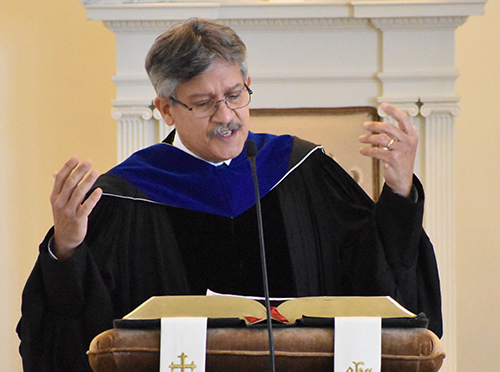Faculty Address
 It was the year 1799, when a theologian and teacher in Berlin, Germany, Friedrich Schleiermacher, wrote:
It was the year 1799, when a theologian and teacher in Berlin, Germany, Friedrich Schleiermacher, wrote:
“The virtuosity (or special calling) of a person is… the melody of that person’s life, and it remains a simple, meager series of notes unless religion, with its endlessly rich variety… raises the simple song to a full-voiced, glorious harmony.” (On Religion: Second Speech)
That is how I’ve come to think of a Seminary education: not only as a kind of training, nor merely as a depository of information, but rather as an attempt at creating beautiful music, a composition of sorts, with every student becoming a work of art.
Granted that, as a composition, you may not be quite finished since that’s a life-time process of performance. However, you may already be prepared enough, completed enough, for you to start playing your own notes confidently.
Of course, we know who the main composer is: the one we call God, or deity, and according to the Sprit’s own intended plan for us, collectively and individually. You are, each one of you, like variations on a musical theme, a divinely inspired sonority. You are melody in God’s ears.
To my students in theology, I say at the start of every new semester, that among our aims is for them to find their own theological voices. In my view, this is akin to creating your own song, or to composing your own melody.
Music has contributed much to the worship and liturgy of the Church, but it has also served as a metaphor for theology. In the eight century, the Byzantine theologian Nicephorus said about those who sing the “Holy, Holy, Holy” canticle, as per the vision of the Prophet Isaiah, that “they praise the goodness of God, in that venerable and thrice-illumined melody of theology.”
As you know, music engages the senses. It enriches our lives by the way that we play, sing, and dance; or by feeling the rhythm through vibration, tactfulness, and emotions, and thus, developing our taste, adding expression to the way we live. We discover beauty as we go.
Because of the pandemic, we have probably experienced instances of almost “losing our senses,” as we were deprived of contact with others. We have been missing the peculiar sounds and aromas and movements of those in proximity, people in full view.
But it is also our very sense of reality, not just normalcy, that has been challenged as well, probably similar to the fear of “losing our minds.”
And yet, here we are, but by the grace of God. We are grateful for this opportunity, back together, if just for a moment, celebrating this event, while realizing what we have been yearning for: being with others.
In brief, nothing short of coming back to our senses, to regaining our senses.
I sincerely believe that you, graduates, are ready to play it loud. You have received “voice training,” so to speak. Now add your own flair. Be savvy in performing your calling. You are the melody that God had in mind from the beginning of all things, which is now going to be heard, clear and loud.
According to St Paul, your body, your whole self, you are the worship that pleases God, a rational and spiritual offering.
As you play your music hard and loud, be also mindful of the others around you. They are pursuing their own calling or vocation in life.
In her book Holy Envy, Barbara Brown Taylor, speaking about the church hymns that she loves so much to sing with gusto, also wonders whether she’s been doing it “without giving a thought to those whose music I might be drowning out.”
That’s a good reminder that we are not alone. That we have also been taught to sing together, seeking harmony with others, regardless of who they are. Thus, avoid the dissonance, the cacophony that overrides conversations, and the noise that drowns sound judgment.
In brief, it is time to come back to our senses. I think this might be the imprint of a good Seminary education, as well as a testimony to God’s goodness.
Congratulations, Classes of 2020 & 2021!
May God bless you all!
